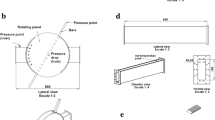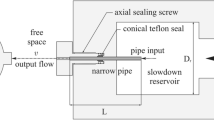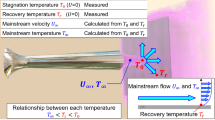Abstract
THE need has been felt for some years past for an instrument which will measure low velocities of water-flow over the cross-section of an open channel or a pipe. The use of the Pitot tube, which has proved so valuable in the case of the flow of gases, becomes quite impracticable in the case of slow-moving liquids owing to the difficulty of measuring the extremely small pressure differences involved and also to the need for strict thermal control of the connecting tubes. Rotating-vane flow-meters are likewise impracticable at low flow values, because of uncertain spindle friction. Exposed hot wires accumulate gas bubbles around themselves, and the enclosed type becomes excessively slow in response as the velocity is decreased.
This is a preview of subscription content, access via your institution
Access options
Subscribe to this journal
Receive 51 print issues and online access
$199.00 per year
only $3.90 per issue
Buy this article
- Purchase on Springer Link
- Instant access to full article PDF
Prices may be subject to local taxes which are calculated during checkout
Similar content being viewed by others
Author information
Authors and Affiliations
Rights and permissions
About this article
Cite this article
BAGNOLD, R. Measurement of Very Low Velocities of Water-flow. Nature 167, 1025–1027 (1951). https://doi.org/10.1038/1671025b0
Issue Date:
DOI: https://doi.org/10.1038/1671025b0
Comments
By submitting a comment you agree to abide by our Terms and Community Guidelines. If you find something abusive or that does not comply with our terms or guidelines please flag it as inappropriate.



